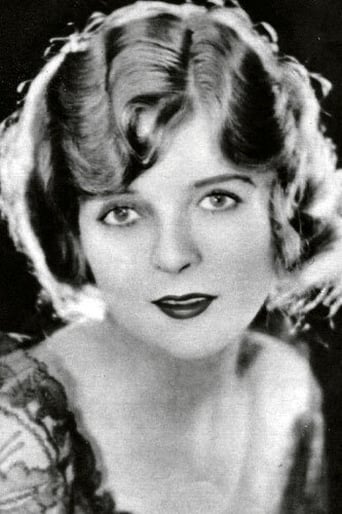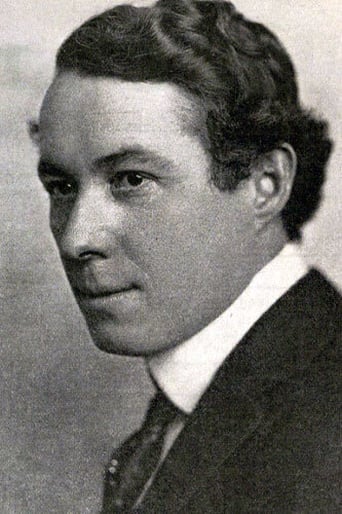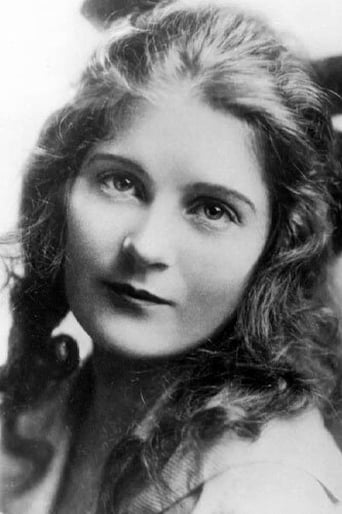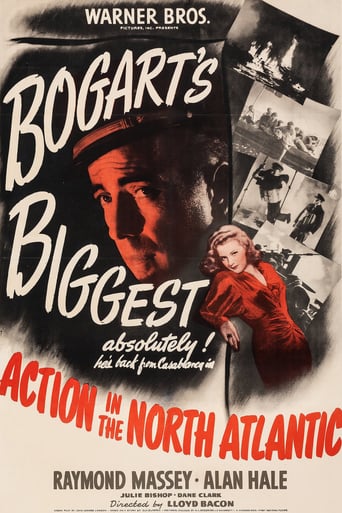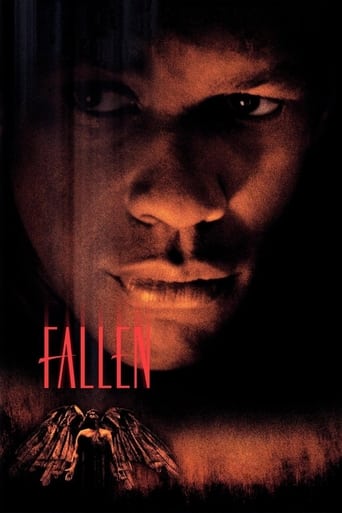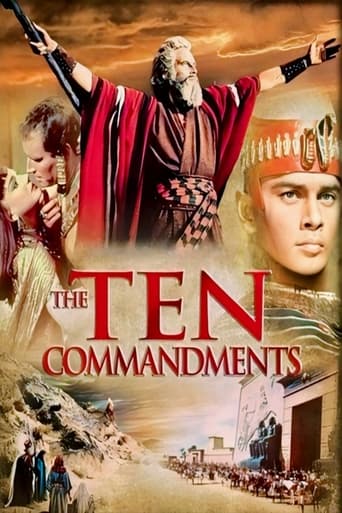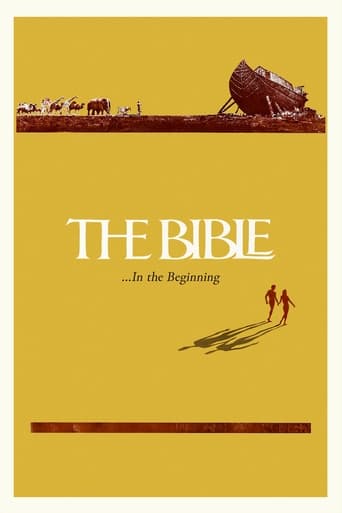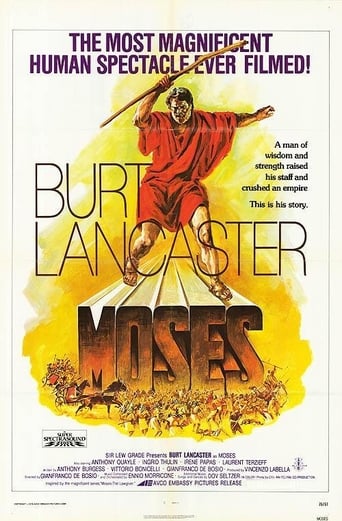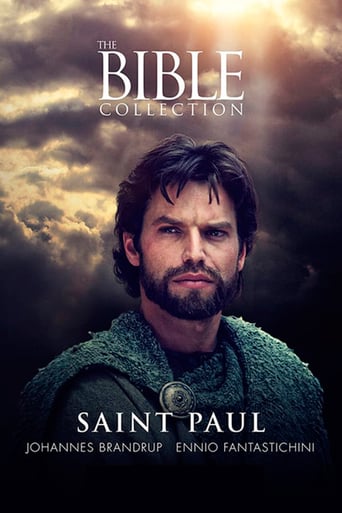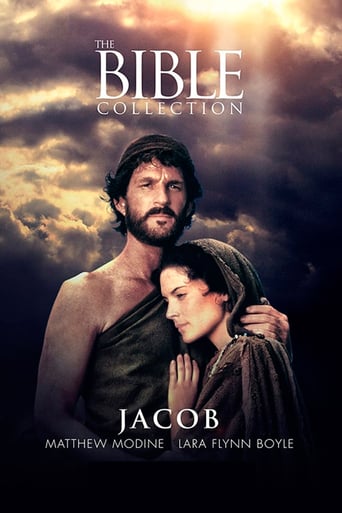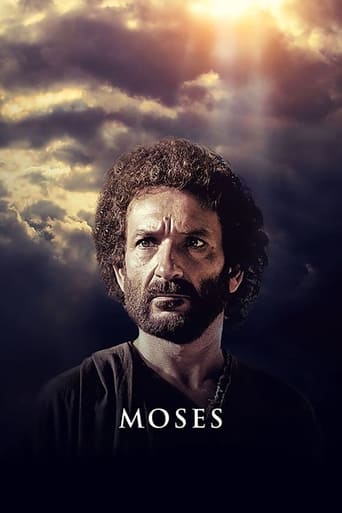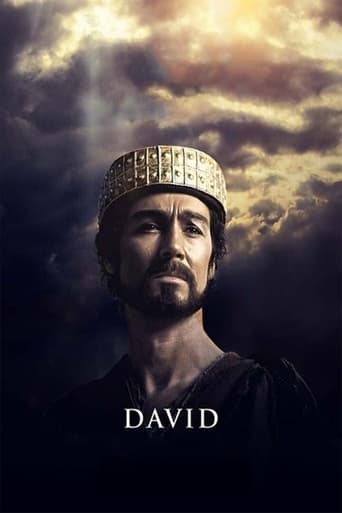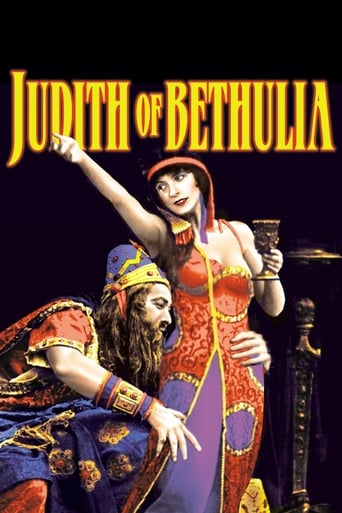
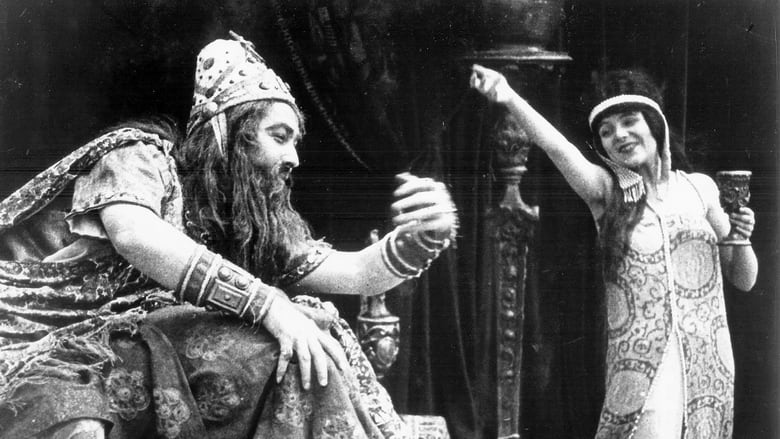
Judith of Bethulia (1914)
Griffith adapts the story of the Apocryphal Book of Judith to the screen. During the siege of the Jewish city of Bethulia by the Assyrian tyrant Holofernes, a widow named Judith forms a plan to stop the war as her people suffer in starvation, nearly ready to surrender.
Watch Trailer
Cast


Similar titles
Reviews
Wonderful character development!
Good start, but then it gets ruined
At first rather annoying in its heavy emphasis on reenactments, this movie ultimately proves fascinating, simply because the complicated, highly dramatic tale it tells still almost defies belief.
Not sure how, but this is easily one of the best movies all summer. Multiple levels of funny, never takes itself seriously, super colorful, and creative.
"Judith of Bethulia" was one of the first great full-length epics. While the Italian film, "Cabiria", came out later in 1914 and was much longer and much better, "Judith" did debut first--and no doubt its success led to director D.W. Griffith making his next great epic "The Birth of a Nation".The story is from the Apocrypha and apparently there was also a play about Judith as well--and Griffith crafted his story based on both. As far as the historical accuracy of the story goes, it's got some plot holes and inaccuracies but it makes for a nice story.The film begins with the Assyrians under General Holofernes (Henry Walthall--though he's difficult to see under that giant beard) attack the most likely fictional town of Bethulia. The Jews' faith wavers, but the fair widow, Judith (Blanche Sweet), has faith that God will deliver the city from the Assyrian army. When God doesn't act, Judith takes matters into her own hands--and disguises herself as one of Holofernes' strumpets (he has a lot and never actually seems to do much of anything but party). Eventually, Judith finds him drunk and whacks off his head and presents it to her people. The Assyrians in turn run like babies.So what's to like? The film looks amazing for 1914. The costumes, sets and the look of the film are a HUGE step forward for the film industry and it looks great. It also helped that the actors were quite distinguished and tended to act in a reasonable and restrained manner (for the most part). The only serious negatives are the language in the film (it's very old fashioned and occasionally silly) and that the film is occasionally heavy-handed. A very good film overall.
Judith of Bethulia is, depending on your definition, Griffith's earliest full-length feature, or his longest short. While nowhere near as mammoth in length as Birth of a Nation, in scope and ambition it is a leap forward from two-reelers like The Battle of Elderbrush Gulch. In any case, it was certainly Griffith's first genuine attempt at making a feature, and only really suffered from curtailment by the Biograph bosses.The care Griffith takes in establishing character was nothing new, and neither were the techniques he uses for staging the battle sequences. What stands out here though is how constant the quality level is. While the whole is clearly lacking some development - the romantic angle between Mae Marsh and Bobby Haron appears to have been a casualty of Biograph's cutbacks - what does remain is consistently of a high standard. There are no wrong notes, no awful performances and no misjudged cuts. In this respect Judith of Bethulia differs from many of the better known Griffith features, which whilst appearing fully rounded and complete, were often peppered with weak moments.Nevertheless, Griffith has clearly put a lot of thought into the structure of Judith of Bethulia. The film is filled with counterpoint and contrast, and it is in fact this which gives it the nature of a feature and not a short. The majority of Biograph shorts dealt with one form of business at a time - frenzied action, emotional turmoil, loving harmony and so forth - and any attempts to mix and match these tended to be a bit of a mess. In Judith of Bethulia Griffith pulls off just such a blending. For example, when Judith is wrestling with her conscience over whether she can murder Holofernes, Griffith intercuts the Bethulian soldiers' dash to recapture the well. The ensuing battle scenes would seem to be at odds with Judith's agonising, yet by now the audience has bought into her situation and the counterpoint works. Another example occurs in the middle of the film, where Griffith cuts back and forth between Judith's decision to go forth into the enemy camp, and Holofernes executing a cowardly soldier. Why intercut between these two seemingly unrelated scenes? Because they are the defining moments of character exposition for both - Judith's spiritual awakening, and Holofernes at his most barbaric.In relation to the above, there is also a lot of contrasting of Bethulian piety and purity with Assyrian debauchery. This kind of religious moralism is rare in Griffith's work, although as anyone who has seen more than a few of his films will know he was happy to wear almost any political or philosophical hat so long as it suited the story.Griffith casts what were, at the time, all his favourite leads, hence the generally strong performances throughout. The historical setting allows for a little more hammyness and theatricality than would be acceptable in a contemporary drama, which means things even out nicely given the generally naturalistic but occasionally over the top acting styles of the late Biographs. It's interesting to see Lillian Gish cast in a supporting role as "the young mother". To date her best and most prominent performance had been in The Mothering Heart, and she also played the token mother of the token baby in The Battle of Elderbrush Gulch. Later, when she was Griffith's primary female lead she would play the purely symbolic mother figure, eternally rocking the cradle in Intolerance. Although she never had a child in real life, with her tender features Griffith had clearly singled her out as the archetypal mother, specifically of babies.Judith of Bethulia was inevitably overshadowed by the three-hour extravaganza that was Birth of A Nation. Now that Birth has been denounced as racist nonsense, film buff favourites Intolerance and Broken Blossoms are now most often cited as Griffith's ones to watch. It's really about time Judith of Bethulia was given recognition as Griffith's true feature debut, and the crowning achievement of his days at Biograph.
Since it is Easter time, Herr Graf's curiosity about strange Christians' pious habits led to a decision to watch a film inspired lightly by or based on religious scenes ( although aristocrats don't share any Christian feelings about their fellow men at this time or any other time of the year ). For this reason "Judith Of Bethulia" was chosen, a film located in Bethulia, a village near Jerusalem, so it was perfect penance for this German aristocrat. "Judith Of Bethulia" was the last film directed by Herr D.W. Griffith for "Biograph Studios" because the American director had a strange idea about how many reels were necessary to depict a story, an opinion about film running time that the company didn't share ( afterwards Herr Griffith would take revenge and put his theory in practice in his well-known and longer silent films ). The film is the story of Damen Judith, a widower who, in order to save her city from the Assyrian invaders and the thirst and famine that her countrymen suffer in the besieged city, sacrifices her virtue to Herr Holofernes, the invading leader."Judith Of Bethulia" is a film in which the techniques are recognizable which made the American director famous in the silent world, even though this film exposes them in a subtle way: not forgetting the pace, the perfectly entwined shots and situations, the strong male characters that Herr Griffith was so fond of, and the fragile and self-sacrificing little fräuleins so characteristic of his cinema. This film is not remarkable but perfect ( clean, even antiseptic ) in its technical, formal and performing aspects.And now, if you'll allow me, I must temporarily take my leave because this German Count must sacrifice himself to one of his devoted fat German heiresses.Herr Graf Ferdinand Von Galitzien http://ferdinandvongalitzien.blogspot.com/
The first feature-length film from DW Griffith, JUDITH OF BETHULIA tells the story of a young widow who saves her city (Bethulia) from the Assyrians by an act of treachery.It's a warm-up for Griffith's masterpiece, INTOLERANCE, a few years later but still has merit of its own despite hammy acting and lackluster sets.Blanche Sweet (then 18) stars as Judith and is very pretty but the acting style (it is 1914 after all) is still crude with waving arms and long dramatic poses. Henry B. Walthall is the head of the Assyrian army, Mae Marsh and Robert Harron play the young lovers, Lillian Gish is a young mother, Dorothy Gish is a young cripple, Kate Bruce is the loyal maid, Harry Carey is the traitor.The extras (in heavy makeup) include Lionel Barrymore, Antonio Moreno, Elmo Lincoln, Mary Gish (mother of the stars), and someone named J. Jiquel Lanoe who is quite excellent as the head eunuch.Certainly worth a look but this seems very amateurish compared to what was coming. The film is also famous for going well over budget and getting Griffith fired from Biograph Studio.


